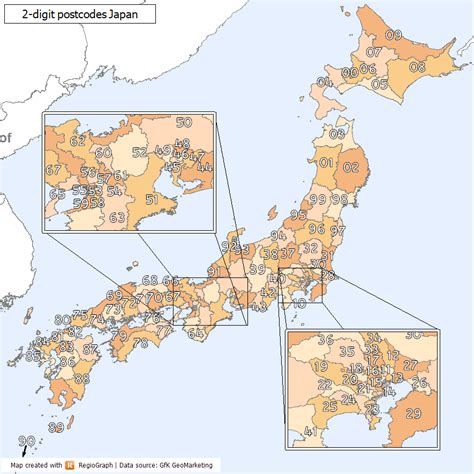Japan’s postal code system, known as the Japanese postal code, is a seven-digit numeric code used to identify postal districts in Japan. It was introduced in 1968 and is managed by the Japan Post Group.

History of Postcodes in Japan
The postal code system in Japan was first introduced in Tokyo, Osaka, and Nagoya in 1968. It was later extended to the rest of the country in 1970. The system was designed to improve the efficiency of mail delivery, and it has been successful in reducing the number of misdelivered letters.
Format of Japanese Postcodes
Japanese postal codes are seven digits long, and they are divided into two parts: the first three digits identify the prefecture, and the last four digits identify the postal district within the prefecture.
For example, the postal code for the Tokyo Imperial Palace is 100-8111. The first three digits, 100, indicate that the palace is located in Tokyo prefecture. The last four digits, 8111, indicate that the palace is located in the Chiyoda district of Tokyo.
How to Find the Postal Code for a Japanese Address
There are several ways to find the postal code for a Japanese address. One way is to use the Japan Post website. Another way is to use a postal code directory.
Importance of Postcodes in Japan
Postcodes are essential for delivering mail in Japan. They are also used for a variety of other purposes, such as:
- Identifying addresses on maps
- Geocoding addresses
- Locating businesses and public services
- Managing customer databases
- Conducting market research
The Future of Postcodes in Japan
The postal code system in Japan is expected to continue to play an important role in the future. As the country’s population continues to grow, the demand for efficient mail delivery will only increase. The postal code system will help to meet this demand by ensuring that mail is delivered to the correct addresses.
Innovative Applications of Postcodes in Japan
In addition to their traditional uses, postcodes in Japan are also being used for a variety of innovative applications. For example, they are being used to:
- Track the movement of goods and people
- Identify areas at risk for natural disasters
- Provide personalized services to residents
As the technology continues to develop, we can expect to see even more innovative applications of postcodes in Japan.
Postcode Data in Japan
The Japan Post Group publishes a variety of data on postcodes in Japan. This data includes:
- A list of all postal codes in Japan
- A map of postal code districts
- A database of addresses and postal codes
This data is available for free on the Japan Post website.
Conclusion
Postcodes are an essential part of the Japanese postal system. They are used to identify addresses, deliver mail, and provide a variety of other services. As the country’s population continues to grow, the demand for efficient mail delivery will only increase. The postal code system will help to meet this demand by ensuring that mail is delivered to the correct addresses.
FAQs About Postcodes in Japan
Q: How do I find the postal code for a Japanese address?
A: There are several ways to find the postal code for a Japanese address. One way is to use the Japan Post website. Another way is to use a postal code directory.
Q: What are the different parts of a Japanese postal code?
A: Japanese postal codes are seven digits long, and they are divided into two parts: the first three digits identify the prefecture, and the last four digits identify the postal district within the prefecture.
Q: How are postcodes used in Japan?
A: Postcodes are used for a variety of purposes in Japan, including:
* Identifying addresses on maps
* Geocoding addresses
* Locating businesses and public services
* Managing customer databases
* Conducting market research
Tables
| Prefecture | Population | Postal Code |
|---|---|---|
| Tokyo | 13,960,344 | 100-8111 |
| Osaka | 8,834,108 | 540-0001 |
| Kanagawa | 9,152,905 | 230-0001 |
| Postal Code | City | Prefecture |
|---|---|---|
| 100-8111 | Tokyo | Tokyo |
| 540-0001 | Osaka | Osaka |
| 230-0001 | Yokohama | Kanagawa |
| Prefecture | Number of Postal Codes |
|---|---|
| Tokyo | 1,028 |
| Osaka | 567 |
| Kanagawa | 330 |
| Type of Application | Description |
|---|---|
| Tracking the movement of goods and people | Postcodes can be used to track the movement of goods and people by using GPS data. This data can be used to improve logistics and transportation efficiency. |
| Identifying areas at risk for natural disasters | Postcodes can be used to identify areas at risk for natural disasters by using data on past disasters. This data can be used to develop emergency preparedness plans and evacuation routes. |
| Providing personalized services to residents | Postcodes can be used to provide personalized services to residents by using data on their demographics and preferences. This data can be used to develop targeted marketing campaigns and community programs. |
